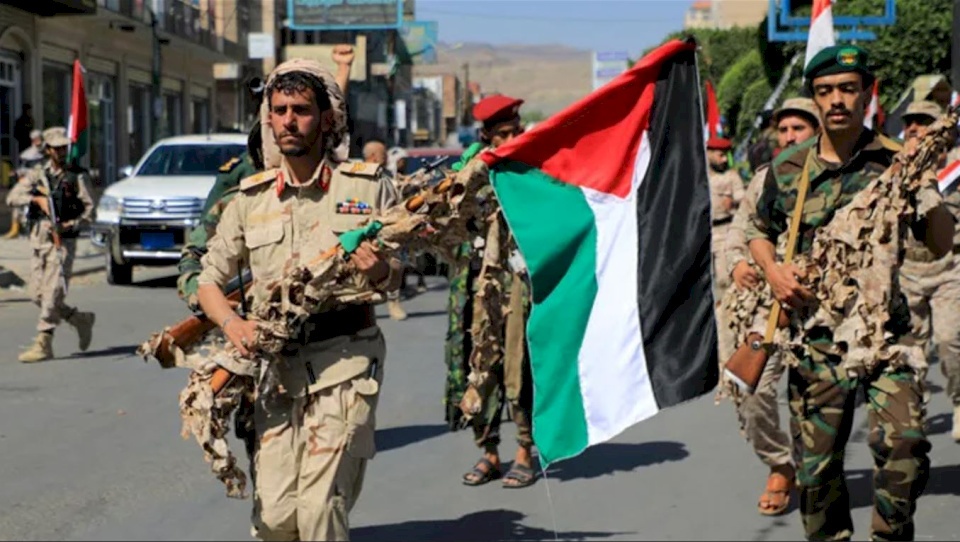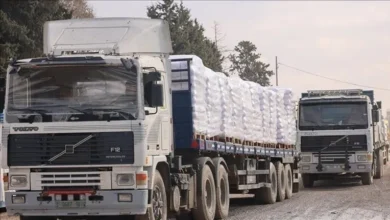Houthi leader says Yemen ready for any Gaza developments, warns Israel: “If you return, we will return”
Al-Khamisa News Network - Gaza

Yemen’s Houthi movement leader Abdul-Malik al-Houthi stressed the continued readiness of Yemen’s armed forces to support Gaza if Israeli aggression resumes.
Al-Houthi said that the late Al-Ghumari “made a major contribution to the support battle for Gaza,” adding that his comrades “continue the path of sacrifice and steadfastness.” He extended condolences and congratulations to the martyr’s family and comrades “and to all the free people who stood on the righteous side against the aggression.”
On the anniversary of the death of senior commander and head of Hamas’s political bureau Yahya Sinwar, al-Houthi said Sinwar “was a symbol of Palestinian steadfastness and sacrifice in the cause of God,” and that his memory “immortalizes great lessons for generations in perseverance and resistance.”
He added that “the Israeli occupation has pushed the entire region to the brink of a major, comprehensive war,” noting that “violations continue in Gaza, alongside a clear reduction in humanitarian aid that is a right of the Palestinian people.”
He went on to say that the Israeli occupation and its backers, led by the Americans, “were forced to negotiate in a hostage-exchange deal after failing to recover the hostages by force,” and that the occupation “thought it would achieve its goals with American and Western support, but it could not, with its horrific crimes, break the will of the Palestinian people and its fighters.”
Al-Houthi said the “recent agreement indicates a very large failure given the resources the occupation possessed and the American and Western participation and support it enjoyed.”
On the support fronts, al-Houthi said “one of the most notable developments of the ‘Al-Aqsa Flood’ operation is the widening of the support fronts, which constituted a qualitative shift in the confrontation.”
He praised Hezbollah’s role in Lebanon, saying it “contributed from the start to the great support for the Palestinian people and was at the forefront in making major sacrifices among its martyrs, leaders and fighters, headed by the great martyr Sayyid Hassan Nasrallah,” stressing that “the enemy sought to eliminate the resistance in Lebanon but failed completely.”
He added that “the Iraq front represented an important development in this round and caused great concern for the Israeli enemy.”
At the same time, al-Houthi pointed to “the steadfast support and major contributions of the Islamic Republic of Iran in facing all challenges and pressures up to the point of war,” recalling its sacrifices in supporting the Palestinian cause and the contributions of “its martyred leaders and fighters, foremost among them the martyr commander Qassem Soleimani.”
Al-Houthi said the distinguishing feature of the support front from Yemen — faith, wisdom and jihad — is the comprehensive movement both officially and popularly, explaining that “Yemeni support operations using missiles, drones and naval actions have continued significantly and with important momentum according to available capabilities.”
Al-Houthi added that “one of the most important developments in the ‘Al-Aqsa Flood’ operation is the large-scale military engagement that has continued for two years.”
He stressed that “the successes achieved in maritime operations are clear and have a significant strategic impact and importance.”
The Houthi leader affirmed that Yemen “reaffirms to the world and to our brothers fighting in Palestine our continuous presence and our permanent readiness to carry out support operations if the Israeli enemy returns to its aggression,” and said that “Yemen is ready for any further developments at this level.”
He said that “aircraft carriers that were a symbol of U.S. power and a banner of its military control have become a burden on the American,” noting that “the U.S. provided political cover and protection for the crime of the century in the Gaza Strip and all its horrific crimes.”
Al-Houthi said “the U.S., along with Britain and Israel, carried out about three thousand air strikes and naval bombardments targeting civilian infrastructure in Yemen.”
He added that “the Americans ultimately failed completely; they did not succeed in preventing the Yemeni stance, limiting it, or disabling or destroying military capabilities,” saying that “Yemeni forces adapted to the challenges and turned them into opportunities.”
Al-Houthi affirmed that “the enemies tried to tighten the siege, but they failed to make the Yemeni people retreat from their supportive position for Gaza,” praising popular cohesion despite “direct targeting, destruction of infrastructure and economic blockade.”
He said “the armed forces have offered personnel as a sacrifice to God within the framework of the righteous and sincere stance,” stressing that “the Yemeni people moved without fearing anyone but God, despite Washington’s attempts to impose restrictions to paralyze the will of the nation and isolate the Palestinian people.”
Al-Houthi revealed that Yemen has conclusive information about “the criminal espionage role of cells arrested who were affiliated with humanitarian organizations,” saying that “enemy spy cells targeting Yemen received extensive training and were provided with sensitive and dangerous equipment.”
He said “one of the most dangerous of these cells were members of organizations working in the humanitarian field, notably the World Food Programme and UNICEF.”
He explained that these cells “played a central role in the crime of targeting a government meeting by monitoring and reporting to the Israeli enemy and facilitating the attack,” and said that “in the crime targeting the government there was a role for a cell affiliated with the World Food Programme headed by the program’s safety and security officer in Yemen.”
Al-Houthi also said that “the U.S. and Israel used humanitarian organizations as a cover to protect those cells from arrest and to facilitate their movement with the resources and means supplied to them.”
He also referred to collaborators of the occupation inside the Gaza Strip, stressing that “the occupation sought to portray the movement of its agents as merely a civil war among a faction of Palestinians against the resistance, but it failed miserably.”
Al-Houthi called for “vigilance and high readiness,” saying that “the Israeli enemy only responds to being compelled, and therefore the resistance must remain on permanent alert for all possibilities and future developments.”
He said “what is hoped for in the coming stage is the continuation of a ceasefire and a broad support effort to allow the reconstruction of Gaza.”
Al-Houthi concluded by reiterating that “the rule with the enemy is: if you return, we will return, and we continue on that basis and are confident in God’s victory,” calling on the Yemeni people to take part in a “massive million-strong turnout tomorrow to affirm steadfastness and readiness for any escalation or violation by the enemy.”






